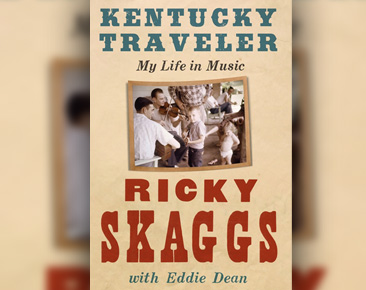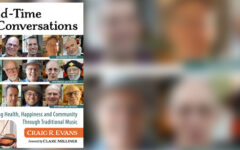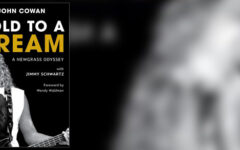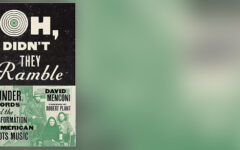
Kentucky Traveler – My Life in Music
by Ricky Skaggs, with Eddie Dean
 I enjoyed Ricky Skaggs’ autobiography Kentucky Traveler, so help me, I really did. When I first heard of it I was skeptical, and afraid it would be sort of embarrassing somehow.
I enjoyed Ricky Skaggs’ autobiography Kentucky Traveler, so help me, I really did. When I first heard of it I was skeptical, and afraid it would be sort of embarrassing somehow.
I’ve been a fan of Ricky’s music (not his rhetoric) since he and Keith Whitley made the Jalyn-129 LP Tribute to the Stanley Brothers in 1971. We’re nearly the same age. My family and I have been fans throughout his career. About the only autograph my dad ever bothered to collect was the 1980s country superstar’s signature on that original Whitley & Skaggs LP jacket! Yet, we’ve often cringed at Skaggs’ statements…
To me there’s no better harmony singer or fiddler than Ricky Skaggs. I’ve left many a festival jam session when it was time to see Skaggs on stage. I even got to sing with Ricky in a 1970s festival grounds jam session. When he sings with Patty Loveless it’s as good as it gets.
So I bought a copy. I was eager to read Kentucky Traveler. But I hoped it wouldn’t be a puff piece that “pulled a lot of punches,” or was too “preachy,” or filled with rhetorical gaffes. ‘Nuff said…
Ricky has delivered a very readable book. Written in the first person, Kentucky Traveler seems as if Ricky is sitting with you, relating his life story over coffee. He seems to anticipate questions us dyed-in-the-wool bluegrass fans would be eager to ask. There are unvarnished glimpses of bluegrass and country personalities, great and small. But the book isn’t a “tell-all.” Ricky doesn’t present himself as perfect or heroic, nor as a victim. He reviews a few regrettable events. He also self-confidently relates some decisions that readers may find more regrettable than he does. This is not an autobiography designed by a publicist.
Mostly, the book is about Ricky’s obsession with making music his way, his self-confidence, and his mother Dorothy’s love and faith.
We learn lots about the Skaggs family’s Kentucky small farm home – big garden, apple orchard, chickens, milk cow, killing hogs, hunting and eating wild game. Ricky expresses pride in his deep roots back to the Long Hunters from Virginia who settled the Bluegrass State. We discover the given name on his birth certificate (not what I expected). We learn about siblings and grandparents; his boyhood Free Will Baptist upbringing; his dad Hobert’s high-end welding skills; family music-making; and about the Skaggs Family Band who tried to make it in Nashville.
The chronological arc through Ricky’s life has plentiful bluegrass nuggets along the way. There are insights into musical neighbors including Santford Kelly who helped Ricky learn old mountain fiddle and clawhammer banjo; Bill Monroe; Lester Flatt’s stage management of little Ricky Skraggs’ (sic) appearance on the Martha White TV show; seeing the Stanley Brothers in person and backstage; his buddy Keith Whitley; Ralph Stanley and the Clinch Mountain Boys; JD Crowe; the Whites; Emmy Lou Harris; a variety of Grand Ole Opry members; and many others including Billy Graham.
The powerful closing chapters tell of taking control of his music business, of his home and family life today, and especially of his faith (with many scriptural citations).
The book is gentle – no one gets trashed, but little seems to have been whitewashed. At times Ricky’s words impressed me as unflinchingly honest. Readers may question his judgment occasionally. Probably a few times he didn’t tell everything he might have. He and Eddie Dean mostly avoided “TMI” (Too Much Information).
There are 8 glossy pages of black and white photos – mostly personal snapshots rather than publicity stills. Just in time for cable TV’s next fad, there’s a great photo of his dad digging ginseng!
Kentucky Traveler is an enjoyable read. The bigger a bluegrass fan you are, the better you’ll like it. It’s also a warm, loving story of family and spiritual life (as boy and man) against a backdrop of the bluegrass and country music business. It’s said you shouldn’t criticize a book for what it doesn’t say. I couldn’t find reasons to do that, even with my lifetime in bluegrass and familiarity with Skaggs’ career. I’ll suggest only that many chapters are so interesting, they could be expanded to book length.
Highly recommended to the experienced bluegrass moldy fig, to those newer to bluegrass who want to learn how a big star “made it”, and to those who want to understand more about Ricky Skaggs himself. Buy it! It satisfies!







